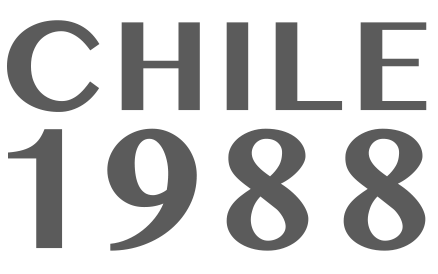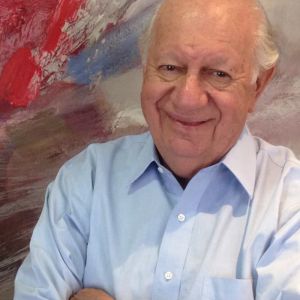Day of the plebiscite. We woke up early like all Chileans. The first thing I learned was that my daughter Ximena informed me that many people were walking to vote around 6:30 or 7 in the morning, over there in La Reina, the popular sector of La Reina. I leave the condominium I had in La Reina, these houses like Castillo Velasco, and I realize that there is a little vineyard, and where the vineyard ends, there is the more public part, and it’s full of press: they were waiting for me to leave the house. I prepare myself to face the press, first I look back and think, “Will I return home tonight?” Well, that was the spirit, that one had doubts but couldn’t express them because then people would get scared. From there, I went to the party headquarters, and around 10 in the morning, I went to vote. Voting took place at a table in a two-story building, but my table was on the first floor. When I arrived, I noticed there was a long line. I join the line. Some people start to notice me, there wasn’t the frenzy of taking pictures like today, but some people also took pictures. And there was a great silence. However, suddenly from the second floor, they start shouting things. And I realize they are referring to me, not in very friendly terms. And then I see that from the second floor, they start responding. And when they discover that I am in the line, in that courtyard, because from the first courtyard, but from the second floor, they are looking at you, and then timid applause starts. And the shouts increase, and the applause increases. And this started to spread down to the first floor. The queues that were peaceful on the first floor, and the people who I think recognized me, many of them, but they pretended not to know me. So, given what was happening upstairs, they got excited downstairs, and a fight broke out between those who applauded and those who jeered. In view of this, I found nothing better to do than to start thanking those above and those below, pretending not to hear the other shouts. That was my voting experience.
From there, we went to Hotel Galerías, where we were in direct contact with our own computer system. There was a computer system for the No campaign, but my party also had its own computer system. We were checking how many polling stations had been set up, etc. It was a quick and frugal lunch, and suddenly I look at the time and say, “Now I’m going to sleep because tonight is going to be long.” And I went with my wife. I was falling asleep, and suddenly they start calling me from outside because Pierre Mauroy was arriving. He had been the Prime Minister of France. Pierre Mauroy had told me, “I will be with you on the day of the plebiscite,” and he kept his word. He arrived on a plane around 11 in the morning, 12 o’clock, and he arrived at the hotel around 3 in the afternoon, so I had to leave and spend some time with him. Later, he went to other places, and around 6 in the evening, a lot of people started arriving. The foreign delegates had to be attended to and explained things to. They behaved very well because everyone wanted to be in Santiago, but they understood that when we told them they had to go to other regions and provinces, because they would be alone in the regions, they did it, and that was very important. People felt protected because a gentleman who is a deputy, senator, minister in his country had arrived.
The No campaign had said that they would give their first tally when we had 10 percent of the polling stations counted. I didn’t pay much attention to that. The fact is that the first tally was in favor of the government, very wide, but when the second tally came out at 9 in the evening, which still gave a small advantage, almost a tie, but a small advantage to the Yes side, I said, “This can’t be, we have to go out.” And that’s when the most serious discussion of the night took place with Genaro Arriagada, because Genaro said, “No, I have to wait for the 10 percent.” And by that point, I told him, “To hell with your 10 percent, I want you to give the numbers when we’re winning.” Then he says, “I have to consult”; basically, it was with Aylwin. And I tell him, “Look, I’m going to call a press conference at 9:30 in the evening, and I’m going to read the tally.” “But you can’t,” “Why can’t I?” I said, “or you do it.” Well, he got scared. At 9:30, the press arrives for my press conference. At that moment, Genaro tells me, “I’m going to start reading my tallies.” So, my press conference consisted of saying, “I want to tell you that at this moment, we’re giving the tallies for the No side, which say that we’re going to win.” And that’s how the problem was resolved.
The second problem was more complex. It was when we were told that in some places, the Carabineros forces were withdrawing, and then apparently, some special forces buses were moving. And we, as I think I told you, knew that these special forces buses had been stolen, they belonged to, stolen from public transportation, and they were Mercedes Benz buses, the same brand, not just the brand, but the same specifications as the buses used by the special forces. And the assumption was that special forces disguised as Carabineros were going to enter certain poor neighborhoods to cause trouble. And we were very concerned about that. Fortunately, apparently, we later found out why things didn’t escalate. And from there, what is already known began. That night, I was not invited to any television channel. It was forbidden to appear on television. And that’s when we saw the conversations between Aylwin and Jarpa on a television channel, where Jarpa congratulates Aylwin and says, “Well, congratulations, I understand that you won.” I received a couple of calls from the Yes campaign telling me that we had won.
And that’s when we started to calm down. The uneasiness was that the government wasn’t releasing results. And in fact, the government didn’t release results until after a board meeting at 12:30 a.m., a meeting attended by Matthei, and her first sentence upon entering the meeting was, “I understand that the No side has won.” It was the first perception of victory. From that point on, events unfolded very quickly. And that meant that around 1 a.m., we were going to announce our final results, and Genaro Arriagada asked me to please go to the No campaign headquarters because Aylwin was going to announce the final result. So, Aylwin announced the final result there, and when he finished reading it, he saw me, and we hugged. It was a hug that traveled around and went around the world. Then I went back to Hotel Galerías, where I thanked those who were there. By that time, there were many, many foreign delegates. A large delegation from the European Parliament arrived, I remember, and the power went out, which caused a lot of commotion. As a result, my brilliant speech that I gave at that moment didn’t go down in history. I heard a piece of it from one of my sons who recorded it. But it was an emotional speech, and it was understandable. What did impact me was seeing a couple of French parliamentarians who started crying. Later, they explained to me that this hadn’t happened to them since they entered Paris with de Gaulle. You can imagine they were older than me. And indeed, they were deeply affected by what had happened. And from there, well, there were many hugs, this and that, and so on. That’s when I said it was the best night of my life, and a journalist said to me, “But how? They say you could be president.” And I said, “I don’t know if that will happen or not, I have no idea, but I can assure you that if I become president, that night won’t be like this one.” I became president, and that night wasn’t like this one.


